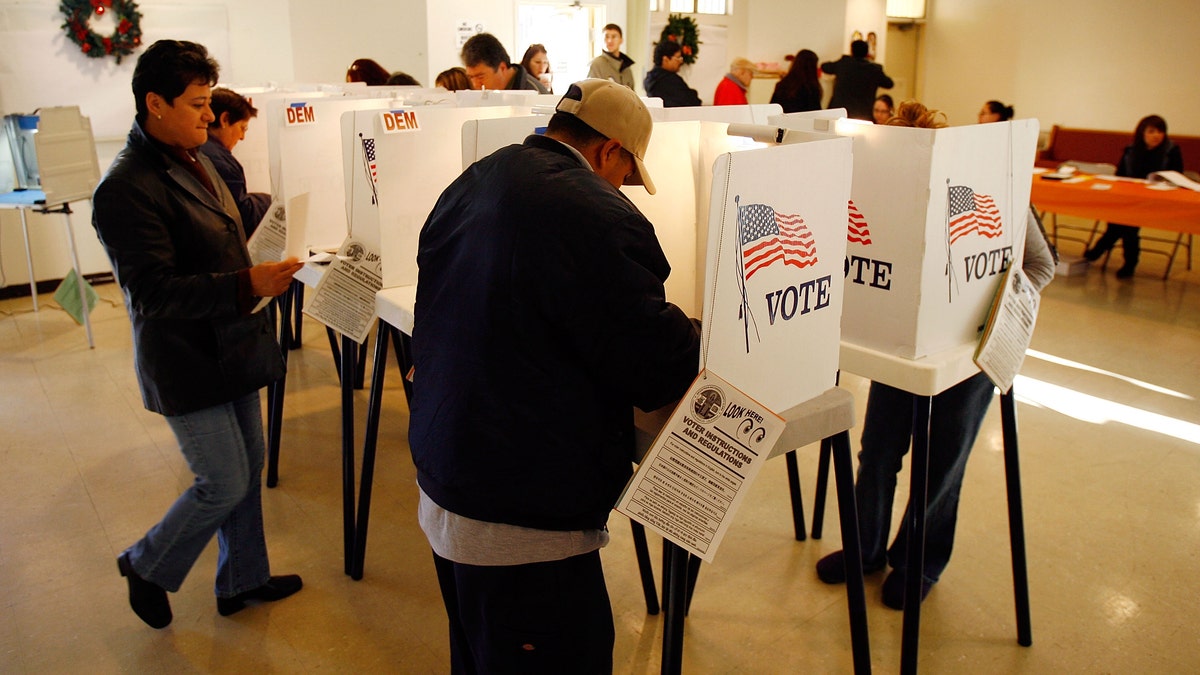
LOS ANGELES, CA - FEBRUARY 05: Voters go to the polls for Super Tuesday primaries in the predominantly Latino neighborhood of Boyle Heights on February 5, 2008 in Los Angeles, California. Latinos are an increasingly important factor in California where they are expected to account for 14 percent of the vote and tend to favor presidential hopeful Sen. Hillary Clinton (D-NY) over rival Sen. Barack Obama (D-IL). At 44 million, Latinos make up15 percent of the US population, the nation's largest minority group according to the latest Census Bureau estimates. (Photo by David McNew/Getty Images) (2008 Getty Images)
Counting just eligible voters when drawing electoral maps would disenfranchise most of the nation’s Latino population, several Latino leaders are warning.
Latino lawmakers and community leaders say that a Supreme Court case which raises the question of whether state electoral districts should be drawn according to total population, or based on just residents who are eligible to vote, threatens to imperil Latinos who are too young to vote or not naturalized citizens.
They say that some 55 percent of Latinos are not eligible to vote and would be robbed of being part of what goes into the selection of elected representatives for a certain district.
“It would hurt every American regardless of race, ethnicity or gender, because it would move away from the long-standing principles of one person, one vote," said Rep. Joaquin Castro, a Texas Democrat, in an interview with Fox News Latino. "There are already a lot of people who are cynical about government and believe that power is concentrated among a few people. This would only make that worse."
"The biggest losers would be families with children, because children would no longer count in our democracy.”
The congressman said if the Supreme Court decided in Evenwel v. Abbott that only eligible voters could be regarded when designing electoral maps, it could lead to moves to manipulate who can be classified as an eligible voter, among other things.
“This has the potential to wipe out decades of progress toward a more perfect union that includes a representative democracy,” said Cristobal Alex, president of Latino Victory Project, which aims to raise the number of Latino elected officials.
“When you’re elected to represent the community, your job as an elected official is to represent the entire community, not just a small subset," Alex said to Fox News Latino. "If we’re going to slice and dice the folks who actually count, then what we’re doing is rolling back a core constitutional principle that ensures that everyone is treated equally.”
He said he hopes the Supreme Court will uphold the principle of one person, one vote.
“We should not create a second class of individuals who are subject to laws written by those who are not accountable or truly representative of the people,” he said.
In Texas, and other states with large immigrant populations, the difference is more than academic. Urban districts include many more people who are too young, not citizens or otherwise ineligible to vote.
Two rural Texas voters are challenging the use of total population data in drawing state Senate districts because they say it inflates the voting power of city dwellers at their expense.
In a letter to supporters, Richard Cohen, president of the Southern Poverty Law Center, wrote: “Voting rights experts say that by not counting everyone – including children, unnaturalized immigrants and others who can’t vote – our political system inevitably will become even more skewed toward the political right, because urban areas will lose representation.”
Their arguments seemed to make some headway Tuesday with Justice Anthony Kennedy, the pivotal vote on so many close high court cases.
When some districts of roughly equal population have dramatically different numbers of eligible voters, shouldn't Texas "at least give some consideration to this disparity that you have among voters?" Kennedy asked.
The Dallas Morning News quoted one of the plaintiffs who filed the suit, Sue Evenwel, as saying: “There are great many people in Texas who are not eligible to vote.”
“This isn’t about them as individuals. I don’t care if they are legal, illegal, or what their race is. … The districts should be drawn by population, yes, but certainly, they should be informed by an understanding of those who are eligible to vote and those who are not.”
Texas officials say that they have the right to decide whom to consider in the drawing of electoral maps.
Meanwhile, Castro, who often has been at odds with Texas Gov. Greg Abbott, offered praise for him.
“I have been very critical of Gov. Abbott and other Republicans in Texas,” Castro said. “I think it’s appropriate that he be defending the one person, one vote principle. I want to thank the state of Texas for doing the right thing.”
The Associated Press contributed to this report.












































